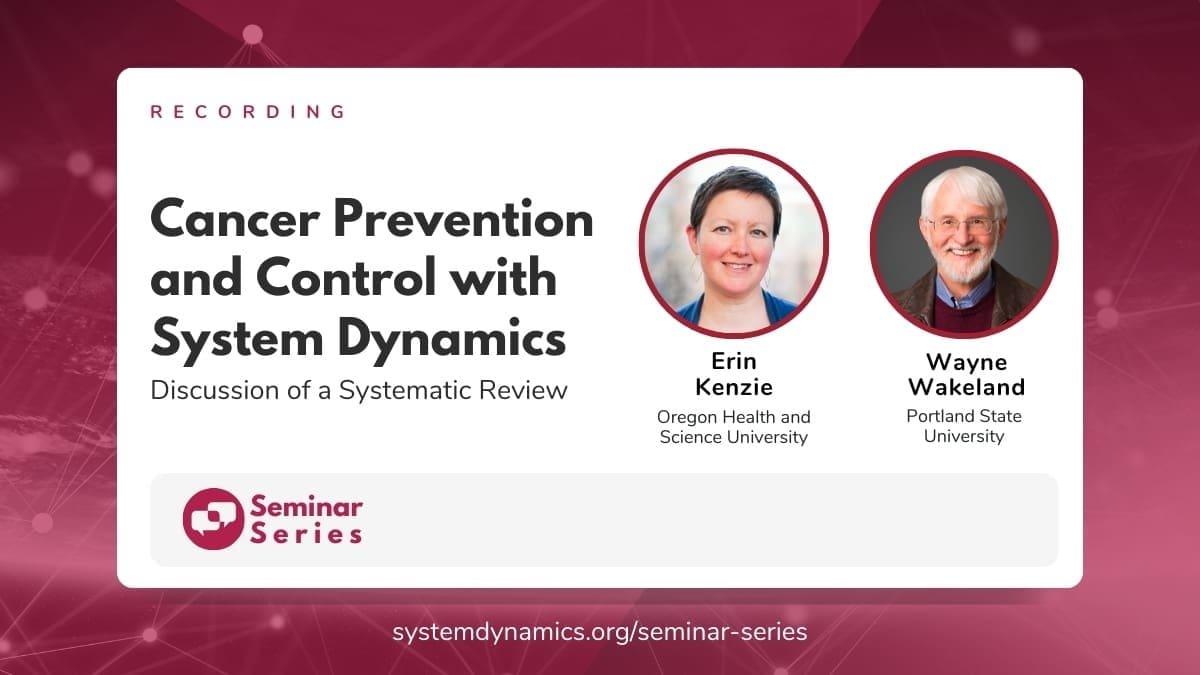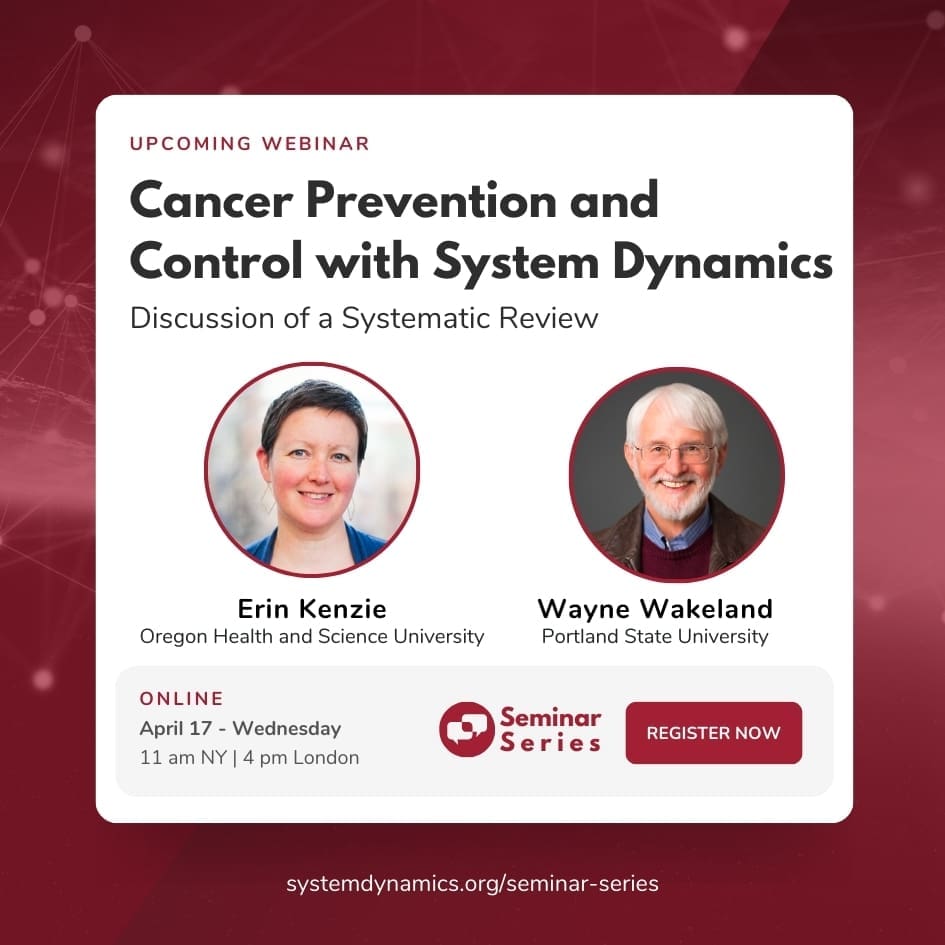Cancer Prevention and Control with System Dynamics
The webinar titled “Cancer Prevention and Control with System Dynamics” presented a systematic review focused on the use of System Dynamics modeling in the field of cancer research. The main objective was to evaluate how this methodology is applied across various studies to address complex issues in cancer prevention and control, including treatments, risk assessments, and intervention strategies.
System Dynamics Modeling for Cancer Prevention and Control: A Systematic Review
Key insights from the webinar included:
- Application of System Dynamics: The review detailed how both simulation models and causal-loop diagrams are utilized to study the dynamics of cancer-related issues, ranging from chemotherapy effectiveness to the impacts of environmental contaminants on cancer risks.
- Quality Assessment: The studies were assessed for quality based on criteria like clarity of objectives, adequacy of information sources, and the involvement of stakeholders. This highlighted a need for more rigorous standards in modeling to enhance reliability and applicability.
- Focus Areas and Interventions: The research covered diverse topics such as the effectiveness of cancer treatments, prevention through behavioral changes, and early detection techniques. It also underscored the importance of System Dynamics in modeling interventions like tobacco use reduction and vaccination strategies.
- Recommendations for Improvement: The presentation stressed the necessity for greater transparency and rigor in System Dynamics studies within cancer research. It called for the development of supportive infrastructures and best practices to foster multidisciplinary collaborations.
The presenters, Erin Kenzie and Wayne Wakeland, through their extensive backgrounds in systems science and health policy, emphasized the potential of System Dynamics to offer comprehensive insights and effective solutions in cancer prevention and control.
For those interested in exploring innovative methodologies and their practical applications in addressing complex health issues, watching the recording of this webinar is highly recommended. It promises valuable learnings in System Dynamics and its significant role in advancing cancer research.
Watch the recording below
Whoops, this recording is available for members and ticket purchasers only. Please login to verify. If you’re not a member, purchase a membership here. You can also buy a ticket to watch the recording here.
PRESENTERS
Erin Kenzie is an Assistant Professor at the OHSU-PSU School of Public Health at Oregon Health and Science University in Portland, Oregon and holds faculty roles at the Portland State University System Science Program and the Oregon Rural Practice-based Research Network. She received her PhD in Systems Science from PSU in 2021. Dr. Kenzie’s research spans system dynamics, implementation science, and public health. She has been involved in research applying System Dynamics to colorectal cancer screening, behavioral health system capacity, unhealthy alcohol use screening and treatment, rural Veteran access to care, health plan-clinic partnerships, behavioral health integration, traumatic brain injury recovery, and climate change mitigation behavior.
Wayne Wakeland is Professor Emeritus of Systems Science at Portland State University. He also served as the Systems Science Program Chair for many years. He earned a B.S. and a Master of Engineering at Harvey Mudd College (1973); and a Ph.D. in Systems Science at Portland State U. (1977). He developed and taught courses on computer simulation methods and more recently a course on system sustainability and organizational resilience. His research focused on the use of computational models for studying a variety of topics, including complications during human pregnancy, recovery from concussion, and policies to reduce opioid drug diversion, abuse, and overdose deaths. Other topics included environmental/ecological sustainability and elevated intracranial pressure due to traumatic brain injusy. He has been active in the System Dynamics Society for many years and helps lead its Health Policy Special Interest Group.
Recent Posts
Society Governance Updates
Society Governance Updates Welcome, Allyson! New President Allyson Beall King joined the Policy Council as our 2024 President. Her primary role is as director of the Washington State University School of the Environment, which focuses on regional ecologies and our...
Call for Presenters: Seminar Series
Call for Presenters: Seminar Series We at the System Dynamics Society are continually seeking vibrant and knowledgeable presenters for our ongoing Seminar Series. As we unfold the calendar, there’s always a place for more insights, experiences, and expertise to enrich...
Honoring Excellence: A Glimpse into the Awards of the International System Dynamics Conference
Honoring Excellence: A Glimpse into the Awards of the International System Dynamics Conference The International System Dynamics Conference brings together experts, practitioners, and students to exchange ideas, showcase real-world applications, and celebrate...
Upcoming Events

2024 Conference Early Bird Registration Deadline
Early bird registration deadline for both live and virtual conference registrations.
Recent Business cases
How Did En-ROADS Get 755,000 users? Lessons on Modeling, Interface Design, and Facilitation
How Did En-ROADS Get 755,000 users? Lessons on Modeling, Interface Design, and Facilitation Achieving widespread engagement is a significant challenge with a System Dynamics model. Yet, En-ROADS, a climate solutions simulator developed by Climate Interactive and MIT...
Solving Bottlenecks in Dairy Production Facilities with System Dynamics
Solving Bottlenecks in Dairy Production Facilities with System Dynamics EXECUTIVE Summary FrieslandCampina faced potential bottlenecks in production due to the merging of two factories. They hired SD&Co which employed system dynamics simulation models to predict...
A Design Value Calculator: A System Dynamics Boardgame
A Design Value Calculator: A System Dynamics Boardgame EXECUTIVE Summary Product design is a specific form of complex innovation that touches all areas of an organization’s management. While entrepreneurs recognise the value of design, they often tend to focus...
Join us
Cancer Prevention and Control with System Dynamics
April 17 at 11 am NY | 4 pm London | 11 pm Beijing | Time Converter



